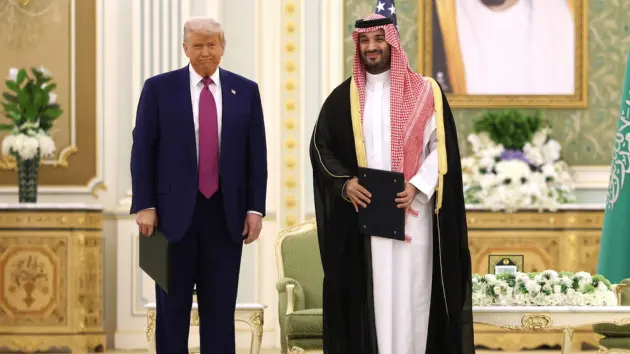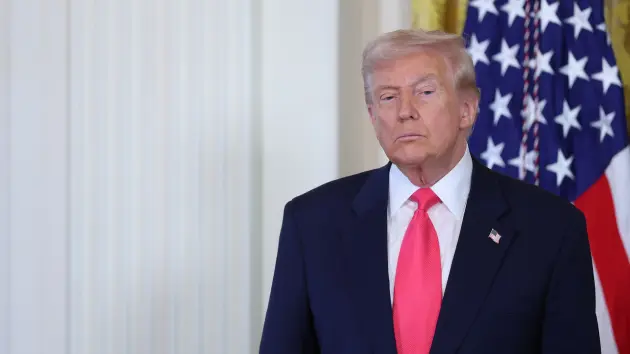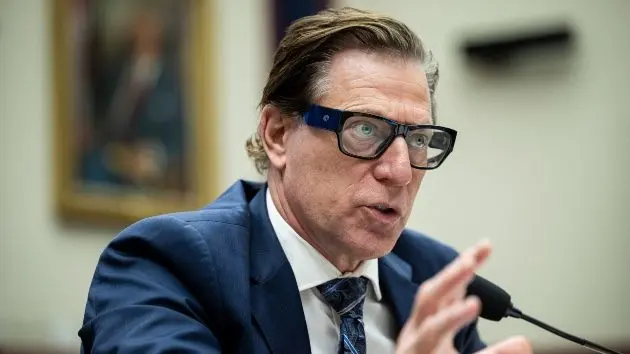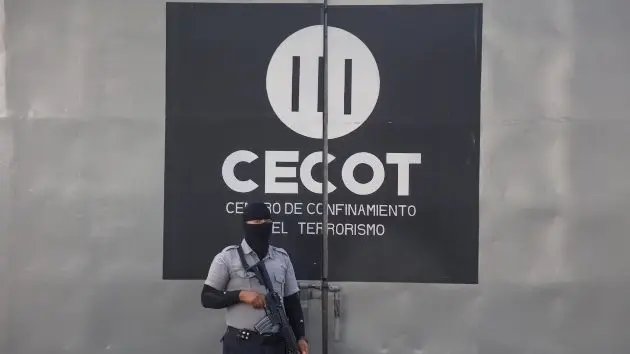(WASHINGTON) — Tuesday marks the first time His Royal Highness Prince Mohammed bin Salman, the crown prince and prime minister of Saudi Arabia, steps foot in the U.S. since 2018, following the death of Saudi critic Jamal Khashoggi by Saudi agents in Istanbul, which caused global outrage.
The crown prince denied ordering the operation but ultimately acknowledged responsibility as the kingdom’s de facto ruler.
Now more than seven years later, the Saudi leader has business on his mind as he seeks to deepen ties with the U.S. through cooperation on oil and security, while also expanding the regime’s global outreach in finance, artificial intelligence and technology. Saudi Arabia notably boasts the world’s largest economy and maintains its lead as the world’s top oil producer.
The crown prince will meet with President Donald Trump at the White House and he’ll be invited in with pomp and circumstance. Saudi flags were seen draped in front of the White House, next to American flags, ahead of his visit.
Trump is also hosting a dinner for the Saudi leader on Tuesday night.
A focus on defense and business
The prince’s trip to the U.S. is being billed as an “official working visit,” and is designed to follow up and advance on Trump’s May appearance in Riyadh — the first official visit of Trump’s second term in office.
“A lot of the financial and economic and artificial intelligence deals that they announced that were very ambiguous six months ago, I think we might start to see some teeth from them this time around and hopefully get a little bit more clarity on what those deals actually are,” said Elizabeth Dent, a senior fellow at the Washington Institute for Near East Policy and former director for the Gulf and Arabian Peninsula in the office of the Secretary of Defense at the Pentagon.
During that May visit, Trump announced a $142 billion arms package with the Saudis, which according to a White House fact sheet was the “the largest defense cooperation agreement” Washington has ever done.
The agreement covers deals with more than a dozen U.S. defense companies in areas including air and missile defense, air force and space advancement, maritime security and communications, the fact sheet said.
The kingdom in turn announced a $600 billion investment in the U.S. spanning multiple sectors, including energy security, defense, technology, global infrastructure and critical minerals.
Some of the other notable deals announced under the $600 billion pledge included investments in: U.S.-based artificial intelligence data centers and energy infrastructure; advanced technologies; Saudi infrastructure projects; U.S. energy equipment and commercial aircraft; the U.S. health care supply chain; and U.S. sports industries.
Trump confirmed on Monday during an event in the Oval Office that he plans to sell F-35s to Saudi Arabia as part of a weapons deal, which experts say would mark the first time those jets have been sold to an Arab military.
“There’s a whole host of issues that encompass this. Part of it is that Israel has to be able to maintain their congressionally-mandated qualitative military edge, which Congress does determine that,” Dent said. “And so, if the deal goes forward, I think we just have to see how they’re going to figure out the best way to ensure Israel can maintain that, as the only country in the Middle East that currently has F-35s.”
“I think the Israelis are probably pretty uncomfortable with these rumors swirling around without normalization in sight,” Dent added.
Saudis insist on ‘credible pathway’ to Palestinian statehood
The Saudi leader is seeking security guarantees from the U.S. amid turbulence in the Middle East. The security agreement with the U.S. has been in a development stage and has not yet been formalized, but the kingdom is seeking to deepen military and security ties between the two countries.
The security guarantees are viewed by some as part of a larger regional “megadeal” involving normalization with Israel, something Trump will surely push for, even as the Saudi kingdom has refused to do so under the current Israeli leadership.
Trump told reporters on Air Force One on Friday that he would discuss the issue with the crown prince.
“I hope that Saudi Arabia will be going into the Abraham Accords fairly shortly,” he said.
Earlier this year, Trump signed an unprecedented defense pact with Qatar via executive order that recognizes the “enduring alliance” between the U.S. and Qatar and provides Qatar an explicit security guarantee in the event of “external attack.”
Many analysts have said they believe the Saudis are looking for a similar defense pact with the U.S.
“I think it’ll be kind of similar to Qatar’s, where it basically just says it will consider any sort of threat or attack on Saudi Arabia to be an attack on the United States, and then the United States will respond appropriately, which could range from political to military options. So, I think that the administration will make sure to give themselves that decision space,” Dent said. “There’s a lot to work through here. Obviously, I think a lot of it will be about expectation management.”
The kingdom is notably invested in implementing the president’s 20-point Gaza peace plan. The kingdom has previously stated it wants to see the emergence of a credible path toward an independent and a free Palestine as a condition for supporting the demilitarization of Hamas and reconstruction of Gaza.
But Israel has put up a roadblock to Palestinian statehood, which will undoubtedly cause angst among Arab regional partners who are pushing for sustained peace in Gaza.
“Our opposition to a Palestinian state in any territory has not changed,” Israeli Prime Minister Benjamin Netanyahu said Sunday during his weekly cabinet meeting. “Gaza will be demilitarized and Hamas will be disarmed, the easy way or the hard way.”
Netanyahu has long opposed a Palestinian state, saying in recent months that its creation would only reward Hamas and endanger Israel’s security.
ABC News’ Christopher Boccia contributed to this report.
Copyright © 2025, ABC Audio. All rights reserved.






